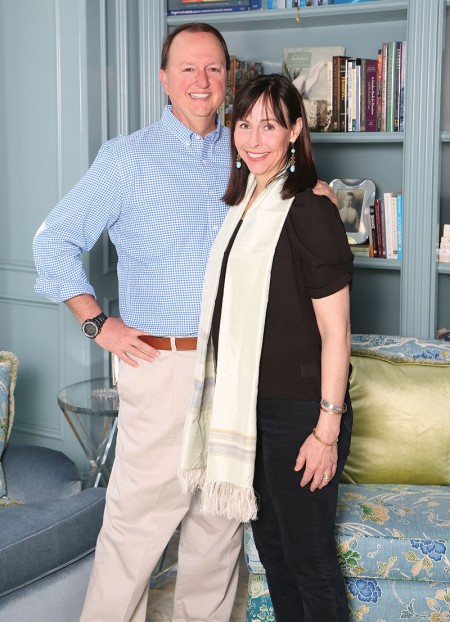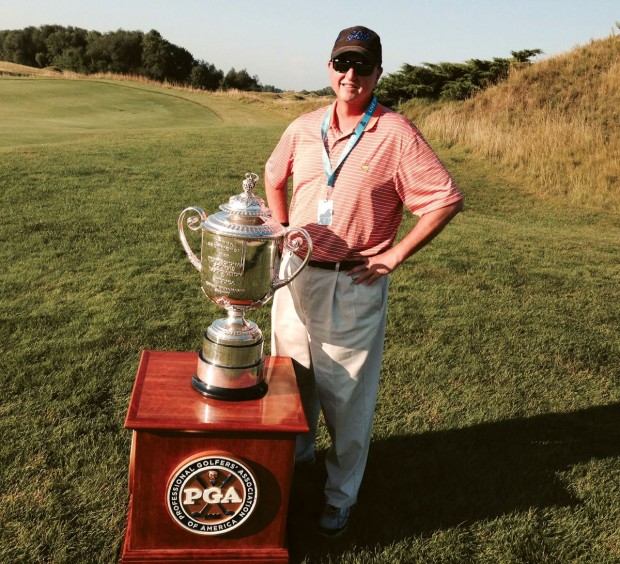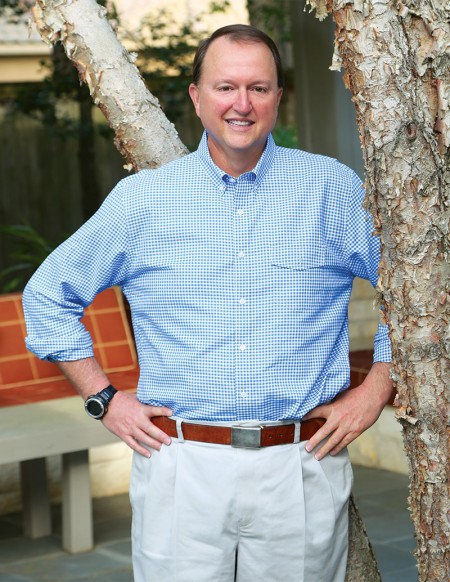Confronting Cancer
With family, golf and Whataburger


Bill Gage credits wife Waverly, who brought him lots of Whataburger shakes, with helping him through his cancer treatments. (Photo: lawellphoto.com)
Bill Gage, a commercial trial lawyer, has a really cool moonlighting gig. Several times a year, Gage hits the road to work the links for CBS Sports at nationally televised golf tournaments. As a “spotter,” Gage is the guy who tells the announcers which professional golfer is using which club and how many yards each has to play to the hole. He has worked tournaments from The Masters to The British Open. But one day, in May 2011, while working the Colonial Golf Tournament in Fort Worth, Gage felt a lump in his neck.
Looking back, Gage wonders why he asked his wife, Waverly, to make a doctor’s appointment. “I despise going to the doctor,” says Gage, a Memorial resident, who felt the lump while he was shaving. “I felt great, but the knot in my neck, it didn’t hurt or anything, it was just there.” His internist sent Gage to an ENT specialist, who performed a fine-needle aspiration on the spot.
“A couple of days after the biopsy, I was preparing to play golf, and as I walked to the first tee my phone rang,” Gage says. “It was the ENT. I don’t recall exactly what she said, but the thrust of it was, ‘You have cancer.’ She said, ‘You have a large tumor at the base of your tongue, and the cancer has moved into your lymph nodes – hence the knot.’”
Stunned, Gage had a hard time wrapping his mind around his diagnosis while he was feeling good enough to play 18 holes. “Being told you have cancer is surreal – especially when it comes completely out of nowhere,” he says. He walked off the course immediately and drove straight home to his wife. “Once the reality sinks in, however, it was frankly scary.”
Gage’s treatment plan included an ENT to oversee the process, an oncologist for chemotherapy and a radiation oncologist for radiation. The treatments started out easy, but then got challenging as the cumulative effects took their toll on his body.
First was three rounds of chemotherapy, which brought out his contrary side when Gage did not agree to get a port line. “A port is basically a device in your chest that they can plug the IV into each time you get chemo, so they don’t have to stick you each time with needles,” he says. “It’s a time saver, but I refused. In my mind, a port was a concession to the disease.”
Gage’s cancer responded well to the chemotherapy, but his body was, in golf terms, in the rough. “I was tired, bald and cold all the time,” he recalls. “It was like being really old and frail.” In fact, the physical transformation was such that at one point, Gage’s dad did not know who he was. “This is how losing your hair, 50 pounds and turning gray in pallor changes you,” he says, brushing his now-full head of hair away with his hand. “I had not seen my father in a week or so, and we were both at a board meeting, and he reached out to shake my hand to introduce himself – he didn’t recognize his only son.”
As difficult as the chemotherapy was cumulatively, it was easy in relation to the radiation. “The nurses started warning me that the chemo was child’s play compared to the radiation-with-chemo that was on the horizon,” Gage remembers. “It’s one of those things you hear but can’t possibly register. Radiation for head and neck cancer sucks. There is no way to sugar coat it.”
It started with a mask, molded from heavy plastic that conformed to his face. “The reason you have a mask is because you cannot move during the radiation process. For me that was approximately 20 to 25 minutes each day for 28 consecutive days. The mask form fits over my entire face and neck. It was locked down on each side and was very ‘snug’ – that’s as polite a word as I can think of.”

Bill Gage played rounds of golf in his head to stay calm while undergoing cancer treatment. Here, he stands with the PGA Championship Wanamaker trophy while working for CBS Sports in Whistling Straits, Wisconsin, in 2015.
Even though Gage doesn’t consider himself claustrophobic, the thought of being pinned down and placed inside a machine similar to an MRI machine, while the radiation was delivered to the correct spot on his neck, was overwhelming. “Each day as I drove to radiation, I tried to think of some way that I could pass the time inside that mask. Because being alone inside the machine, inside the mask for that long, thinking When will this be over? just wasn’t going to work.”
To keep his mind occupied, Gage created a golf game in his head. “I would be ‘playing’ each round and make it is as detailed and vivid as I could,” he remembers. “I would think of courses that I had played, or walked – the back nine at Augusta, back nine at Pebble Beach – playing each shot, walking to the ball, thinking about the weather, the wind, everything, just trying to engage my mind deeply in the fiction I was creating. That was invaluable. I was a much better player then than I am in real life!”
Gage compares the double dose of chemotherapy plus radiation to being struck with a hammer. He says it was important to his recovery that he be as normal as possible and keep up his work and home routine: “Don’t kid yourself, the mental aspect of this is huge.”
Keeping up a positive mental attitude was critical as the side effects of radiation began to get to him. “As the radiation takes its toll, you lose your salivary glands and taste buds and, well, you can imagine what that does to your appetite. It becomes a struggle to swallow, and the lack of saliva in your mouth brings on painful sores inside your mouth. Weight falls off.” Gage was told if he lost too much weight, his doctors would insert a feeding tube — something he vowed to avoid.

Memorial resident Bill Gage is doing well five years after a diagnosis of cancer. (Photo: lawellphoto.com)
The weight issue, oddly enough, ended up becoming a point of salvation for Gage’s wife, Waverly. “The only thing that Bill could eat during that time was banana milkshakes from Whataburger,” recalls Waverly Gage, a lawyer and food writer, who at times felt at a loss to support her spouse. “I would go through the drive-through of the Whataburger on Timmons twice a day and get Bill large milkshakes. The same lady greeted me at the window, and she would say ‘God bless you! Have a blessed day,’ every time. She does not know it, but she was my angel. I love Whataburger because they employ people like her. I love her, and I will never forget her. She saved me because she reminded me that a kind word is always a blessing.”
Waverly says that at times, she struggled when she wanted to help her husband and she could not because he was feeling so sick from his treatments. “But you have to have hope, and there is so much hope out there. One of the best things that Bill did was talk to other men who had been through cancer treatment.”
Gage agrees and says that his wife and their three children, Sara Jane, now 19, William, now 17, and Hudson, now 11, along with talking to other cancer patients, gave him tremendous hope. “Waverly was by my side always,” says Gage, who has now been cancer-free for five years. “She was understanding at the right times, tough at the right times and loving all the time.”
Gage hopes that readers looking at this article will be hopeful if they or a loved one have been diagnosed with cancer. “My overarching theme is if you are diagnosed with cancer, be hopeful. The thing I can’t emphasize enough is to go and talk to someone who has been through it,” says Gage, who has become a volunteer with CanCare, a network of trained volunteers who provide emotional support to others facing cancer. “If someone talks to you about what you are going through, it makes you think, ‘I can get through it too.’ When you get cancer, you become a member of a club you don’t want to join, and when you talk to someone who has had cancer, it is comforting to know that someone who has been where you are is now living life to its fullest.”
Editor’s note: Check out three more stories of life after cancer diagnosis, about Buzz residents Claire Frazier, Ashley Pratka and Stacy Middleman. Plus, see a list of all of their personal resources for surviving cancer. The first Sunday in June marks National Cancer Survivors Day.
Want more buzz like this? Sign up for our Morning Buzz emails.
To leave a comment, please log in or create an account with The Buzz Magazines, Disqus, Facebook, or Twitter. Or you may post as a guest.


